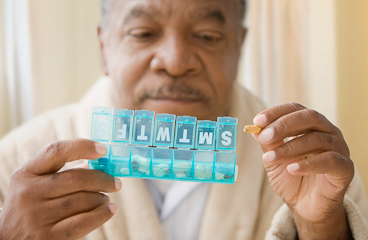Taking Warfarin Safely: Care Instructions

Your Care Instructions
Warfarin is a medicine that you take to prevent blood clots. It is often called a blood thinner. Doctors give warfarin (such as Coumadin) to reduce the risk of blood clots. You may be at risk for blood clots if you have atrial fibrillation or deep vein thrombosis. Some other health problems may also put you at risk.
Warfarin slows the amount of time it takes for your blood to clot. It can cause bleeding problems. Even if you've been taking warfarin for a while, it's important to know how to take it safely.
Foods and other medicines can affect the way warfarin works. Some can make warfarin work too well. This can cause bleeding problems. And some can make it work poorly, so that it does not prevent blood clots very well.
You will need regular blood tests to check how long it takes for your blood to form a clot. This test is called a PT or prothrombin time test. The result of the test is called an INR level. Depending on the test results, your doctor or anticoagulation clinic may adjust your dose of warfarin.
Follow-up care is a key part of your treatment and safety. Be sure to make and go to all appointments, and call your doctor or nurse advice line (811 in most provinces and territories) if you are having problems. It's also a good idea to know your test results and keep a list of the medicines you take.
How can you care for yourself at home?
Take warfarin safely
- Take your warfarin at the same time each day.
- If you miss a dose of warfarin, don't take an extra dose to make up for it. Your doctor can tell you exactly what to do so you don't take too much or too little.
- Wear medical alert jewellery that lets others know that you take warfarin.
- Don't take warfarin if you are pregnant or planning to get pregnant. Talk to your doctor about how you can prevent getting pregnant while you are taking warfarin.
- Don't change your dose or stop taking warfarin unless your doctor tells you to.
Effects of medicines and food on warfarin
- Don't start or stop taking any medicines, vitamins, or natural remedies unless you first talk to your doctor. Many medicines can affect how warfarin works. These include aspirin and other pain relievers, over-the-counter medicines, and natural health products.
- Tell all of your doctors and pharmacists that you take warfarin. Some prescription medicines can affect how warfarin works.
- Keep the amount of vitamin K in your diet about the same from day to day. Do not suddenly eat a lot more or a lot less food that is rich in vitamin K than you usually do. Vitamin K affects how warfarin works and how your blood clots. Talk with your doctor before making big changes in your diet. Foods that have a lot of vitamin K include cooked green vegetables, such as:
- Kale, spinach, turnip greens, collard greens, Swiss chard, and mustard greens.
- Brussels sprouts, broccoli, and cabbage.
- Limit your use of alcohol.
Avoid bleeding by preventing falls and injuries
- Wear slippers or shoes with non-skid soles.
- Remove throw rugs and clutter.
- Rearrange furniture and electrical cords to keep them out of walking paths.
- Keep stairways, porches, and outside walkways well lit. Use night-lights in hallways and washrooms.
- Be extra careful when you work with sharp tools or knives.
When should you call for help?
Call 911 anytime you think you may need emergency care. For example, call if:
- You have a sudden, severe headache that is different from past headaches.
Call your doctor or nurse advice line now or seek immediate medical care if:
- You have any abnormal bleeding, such as:
- Nosebleeds.
- Vaginal bleeding that is different (heavier, more frequent, at a different time of the month) than what you are used to.
- Bloody or black stools.
- Bloody or pink urine.
Watch closely for changes in your health, and be sure to contact your doctor or nurse advice line if you have any problems.
Where can you learn more?
Go to https://www.healthwise.net/patientEd
Enter N655 in the search box to learn more about "Taking Warfarin Safely: Care Instructions".
Current as of: July 31, 2024
